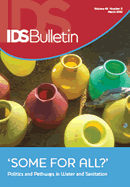'Some for All?' Politics and Pathways in Water and Sanitation

This IDS Bulletin looks back at the legacy of the UN’s New Delhi 1990 global consultation and the Dublin Conference that followed, assessing their meaning and significance, and challenging the wider global water and sanitation community to rethink approaches and emphases, shifting from targets and pronouncement to sustainability and local knowledge, in the context of 2015, the 6th World Water Forum and Rio+20 in 2012. Under the slogan, ‘Some for All Rather than More for Some’, the New Delhi Statement was expected to set a course for the global community to follow in the 1990s.
Articles in this issue derive from Liquid Dynamics II, a STEPS Water and Sanitation Symposium, which brought together current thinkers and past architects of the Statement, as well as academics and those deeply involved in current policy and practice. The notion of Liquid Dynamics helps us address interdisciplinary perspectives and practical action to tackle upfront the challenges of sustainability, uncertainty and social justice in water and sanitation access.
These dynamics have often been ignored in conventional policy approaches, with water and sanitation debates disconnected from the everyday needs of the poor. In 2015, the UN Freshwater Decade will have ended and the MDG targets will come under a critical spotlight – a global policy juncture. We hope that the underlying message of this IDS Bulletin – that it is vital not to forget the past and rush to new futures – will become part of global public discourse in the coming post-MDG world. Understanding how we have arrived at the current situation is key to understanding future pathways to more effective global collective action.

